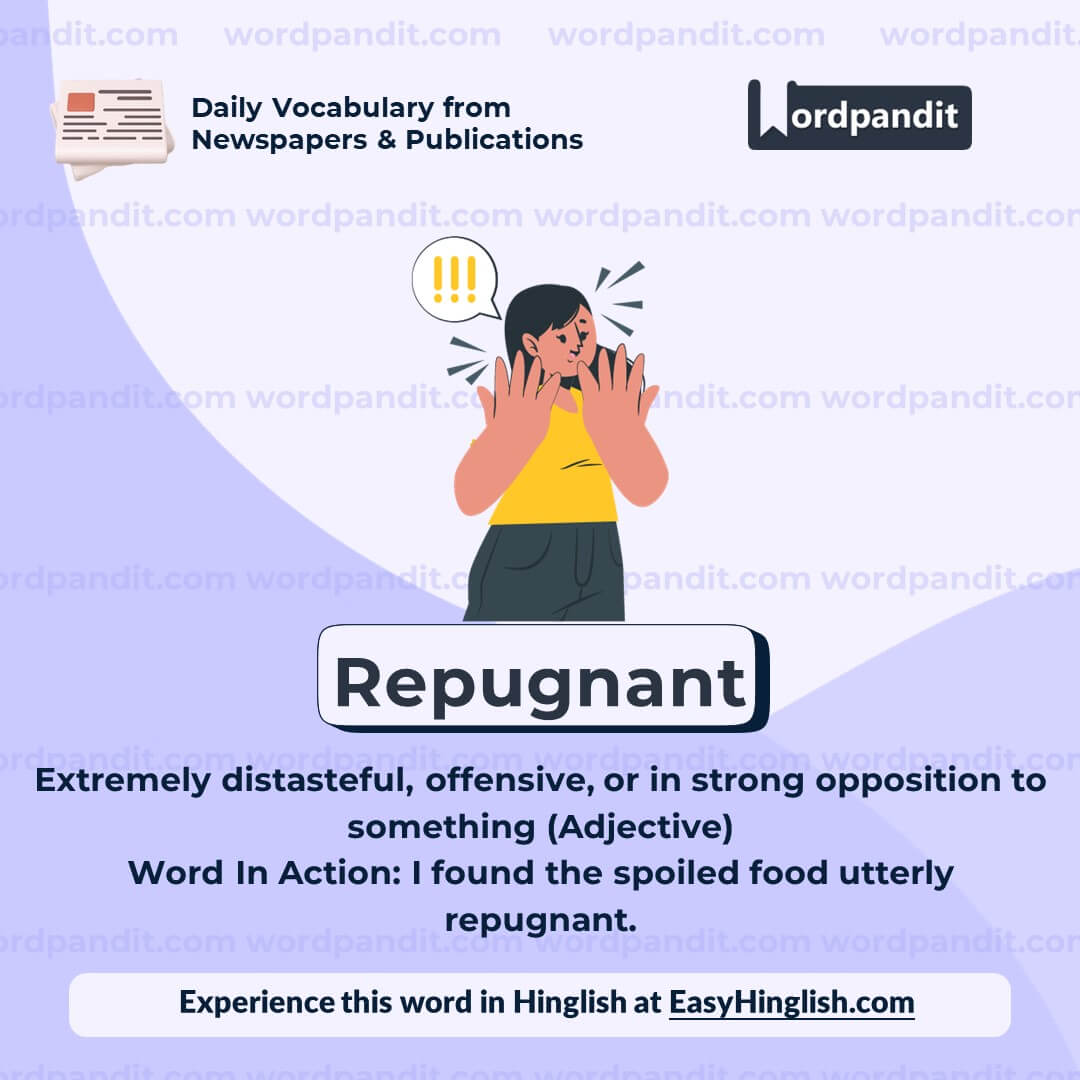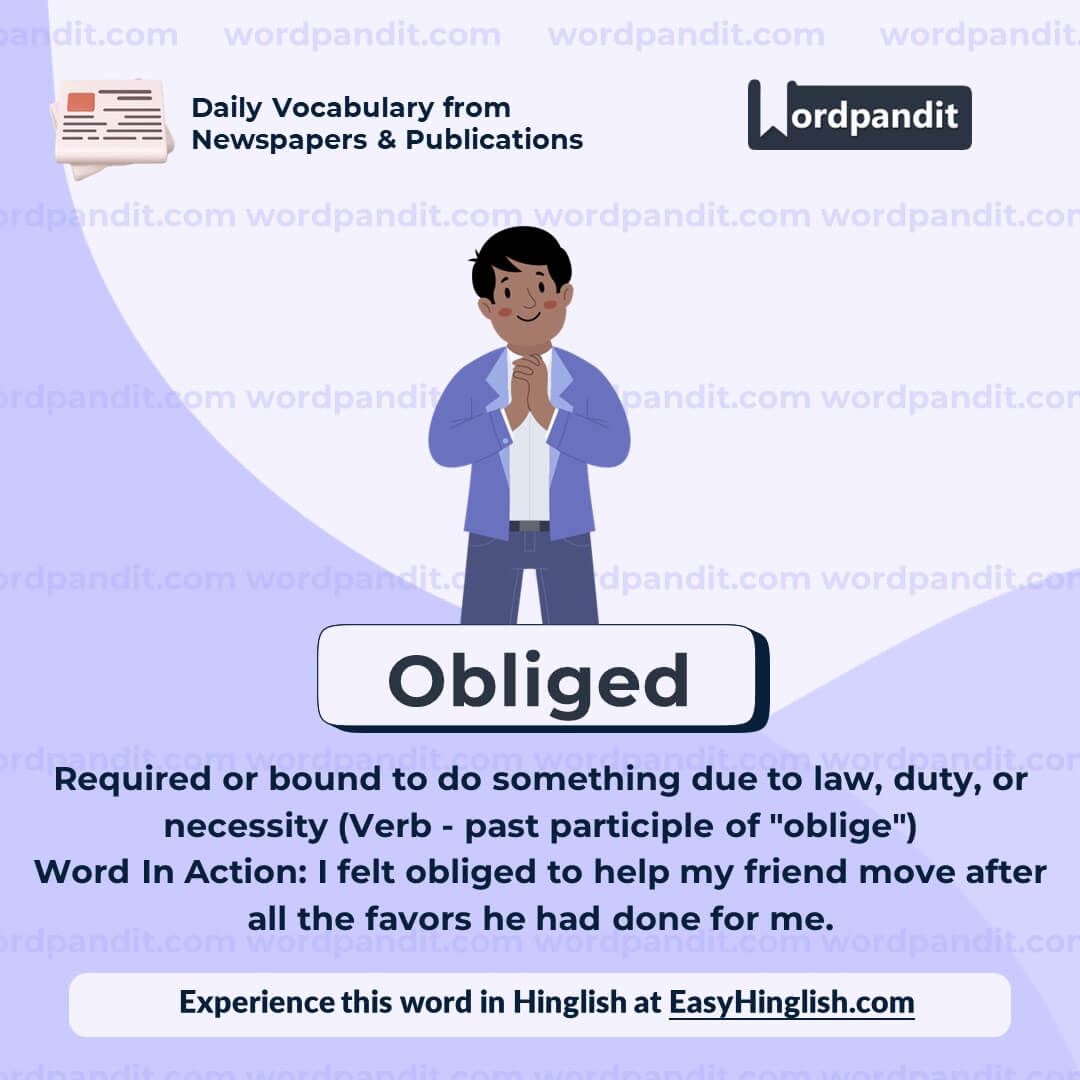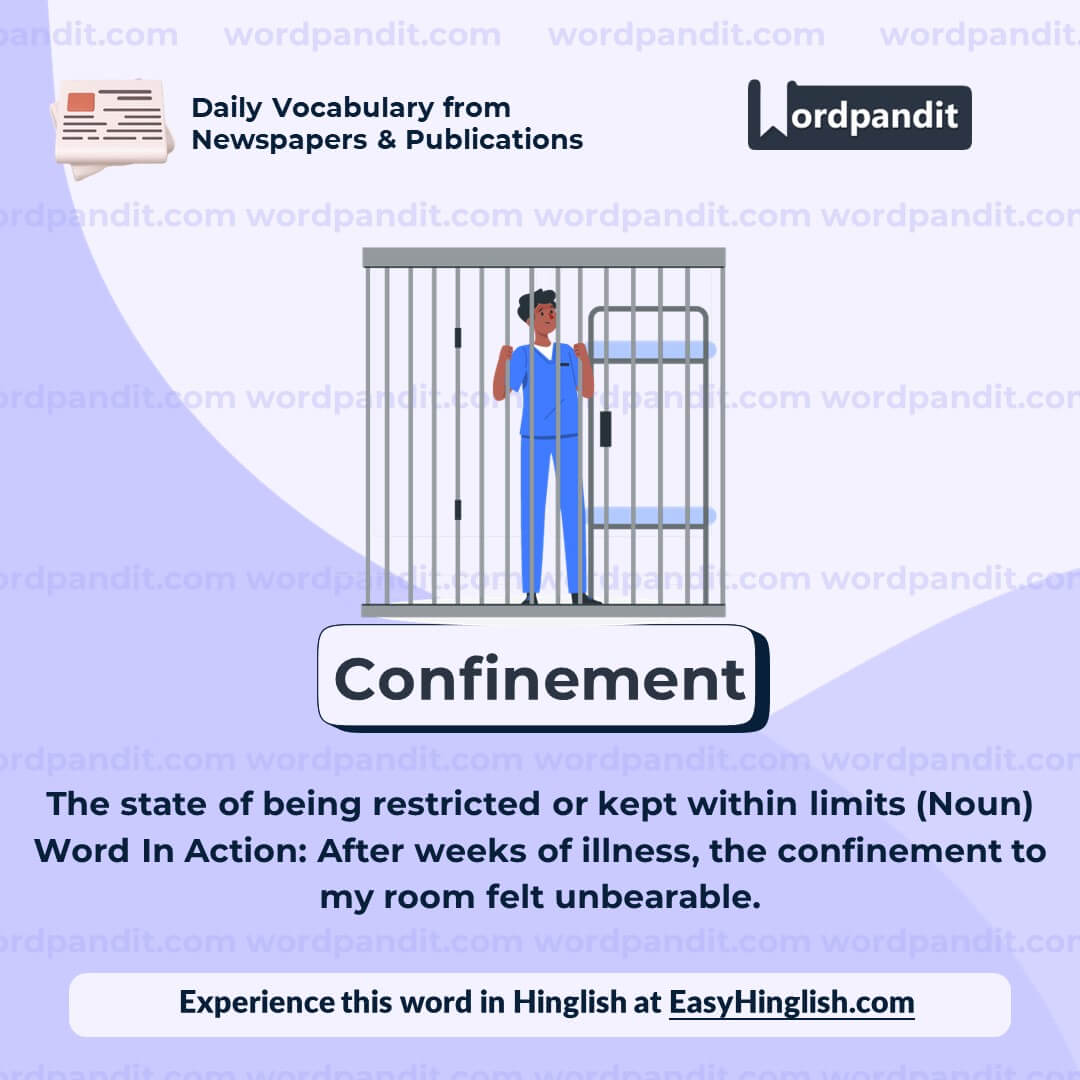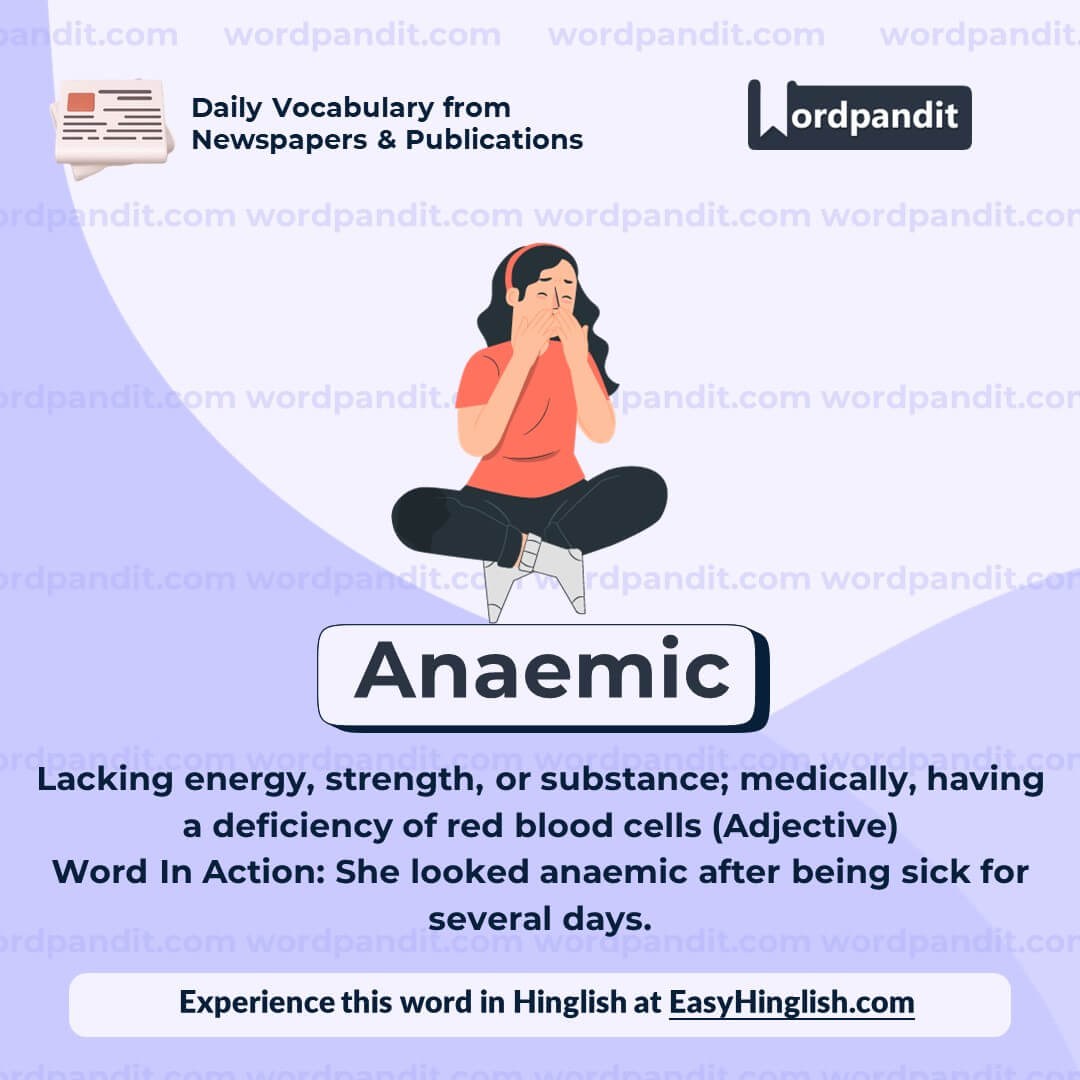Daily Vocabulary from Indian Newspapers and Publications
Welcome to Wordpandit’s Indian Vocabulary Hub
At Wordpandit, we understand the importance of staying rooted in the local context while expanding your language skills. This section focuses on enriching your vocabulary with words and phrases drawn from India’s leading newspapers and publications, ensuring you're learning vocabulary that is practical, relevant, and uniquely Indian.
Why Indian Sources Matter
We believe that the best way to master any language is by immersing yourself in local content. That’s why we carefully curate vocabulary from top Indian publications, including:
- The Hindu
- The Times of India
- The Economic Times
- Hindustan Times
- Live Mint
- The Indian Express
- And many others...
Stay Updated, Stay Relevant
With daily updates from Indian news sources, you’ll be consistently learning words that reflect the trends and shifts in Indian society and culture. Our focus is to provide vocabulary that enhances your understanding of the language in an Indian context.
How Wordpandit Supports Your Goals
Whether you’re preparing for exams, aiming to improve your professional communication, or simply want to stay connected with the latest Indian vocabulary, Wordpandit is here to guide you every step of the way.
Learn with a Practical Approach
Our interactive learning methodology includes real-world examples, engaging activities, and context-specific usage to ensure that every word becomes part of your active vocabulary.
Dive into Indian Vocabulary Today!
Why Choose Wordpandit?
Practical Learning: Focus on words you'll actually encounter in real-world reading, enhancing your comprehension and communication skills.
Diverse Content: From current affairs to scientific breakthroughs, our varied sources expose you to vocabulary across multiple domains.
Effortless Integration: Make Wordpandit a part of your daily routine. Just a few minutes each day can significantly boost your lexicon over time.
Your Path to Vocabulary Mastery
- Visit our Daily Vocabulary section regularly
- Explore new words and their usage in context
- Practice incorporating these words into your own writing and speech
- Track your progress as your vocabulary expands
Start Your Journey Today
Embark on your vocabulary enhancement journey with Wordpandit. By consistently engaging with our daily posts, you'll build a robust vocabulary that serves you well in academic, professional, and personal contexts.
Remember, a word a day keeps linguistic limitations at bay. Make Wordpandit your daily companion in the quest for vocabulary excellence!
WORD-1: Repugnant
Context:
"Earlier in the day, when the bench asked Attorney General (AG) R Venkataramani as to why the governor was silent for years and why did he not communicate with the government, the AG said the governor had not acted outside his jurisdiction by withholding assent and by referring the bills to the President after finding them repugnant (to central laws)." - New Indian Express
Explanatory Paragraph:
The word "repugnant" describes something that is extremely distasteful, offensive, or in strong conflict with something else. It is often used to express moral, ethical, or legal opposition. In the given context, the governor found the bills "repugnant" because they conflicted with central laws, meaning they were inconsistent or incompatible with existing legal frameworks.
Meaning: Extremely distasteful, offensive, or in strong opposition to something (Adjective)
Pronunciation: ri-PUG-nuhnt
Difficulty Level: ⭐⭐⭐ Intermediate
Etymology: From Latin "repugnantem," meaning "opposing, resisting," derived from "re-" (against) and "pugnare" (to fight).
Synonyms & Antonyms:
Synonyms: Offensive, abhorrent, disgusting, objectionable, detestable
Antonyms: Pleasing, agreeable, acceptable, delightful
Usage Examples:
- The idea of corruption in government is repugnant to the principles of democracy.
- She found the unfair treatment of workers completely repugnant and campaigned for labor rights.
- The court ruled that the new policy was repugnant to the existing constitution.
- His repugnant behavior at the meeting shocked everyone present.
Cultural Reference:
"Slavery is repugnant to the principles of justice and humanity." - Frederick Douglass
Think About It:
Can a law or rule be considered repugnant in one society but acceptable in another? What does this tell us about cultural differences?
Quick Activity:
Write a short paragraph about a historical event or practice that you find repugnant and explain why.
Memory Tip:
Think of "repugnant" as "re + pug + nant." Imagine a "pug" (dog) running away in disgust (recoil) from something repulsive. This can help you remember that "repugnant" means "strongly offensive or distasteful."
Real-World Application:
"Repugnant" is frequently used in law, ethics, and morality. For example, a legal expert might describe a new policy as repugnant to the Constitution, indicating that it contradicts established legal principles.
WORD-2: Plenary
Context:
"The state functions in its own domain through plenary powers and there is supremacy of Parliamentary democracy." - New Indian Express
Explanatory Paragraph:
The word "plenary" refers to something that is complete, absolute, or unrestricted. It is often used in legal, governmental, or formal contexts to indicate full authority or power. In the given context, "plenary powers" suggest that the state has full and independent authority within its own domain, without external limitations.
Meaning: Complete, absolute, or full in all respects (Adjective)
Pronunciation: PLEE-nuh-ree or PLEH-nuh-ree
Difficulty Level: ⭐⭐⭐ Intermediate
Etymology: From Latin "plenus," meaning "full" or "complete."
Synonyms & Antonyms:
Synonyms: Absolute, complete, unrestricted, full, comprehensive
Antonyms: Limited, partial, restricted, conditional
Usage Examples:
- The Supreme Court has plenary authority over constitutional matters.
- The CEO was granted plenary control over the company's restructuring process.
- During the plenary session, all members of the committee were required to attend.
- The prime minister exercised plenary powers in times of national emergency.
Cultural Reference:
In international organizations like the United Nations, a "plenary session" refers to a meeting where all members have equal participation and full authority to discuss and decide on matters.
Think About It:
Should any government institution have plenary powers, or should there always be checks and balances? Why?
Quick Activity:
Write a short paragraph about a situation where plenary authority is necessary and beneficial.
Memory Tip:
Think of "plenary" as "plenty" – when someone has plenary powers, they have plenty of authority, meaning full and complete control.
Real-World Application:
The term "plenary" is commonly used in law, government, and business. For example, courts may have plenary jurisdiction over certain cases, and international summits often hold plenary meetings where all representatives have equal authority.
WORD-3: Obliged
Context:
"The governor lacked any discretion aside from being obliged to act on the aid and advice of the state council of ministers, he added." - New Indian Express
Explanatory Paragraph:
The word "obliged" means being legally or morally bound to do something. It can also mean feeling grateful or indebted to someone. In the given context, the governor is obliged, meaning he is required by law or duty to follow the advice of the state council of ministers.
Meaning: Required or bound to do something due to law, duty, or necessity (Verb - past participle of "oblige")
Pronunciation: uh-BLYJD
Difficulty Level: ⭐⭐ Beginner
Etymology: From Old French "obliger," derived from Latin "obligare," meaning "to bind."
Synonyms & Antonyms:
Synonyms: Required, compelled, bound, indebted, grateful
Antonyms: Free, optional, unrestricted, voluntary
Usage Examples:
- As a citizen, you are obliged to follow the laws of the country.
- She felt obliged to return the favor after receiving his kindness.
- The contract obliged the company to deliver the products within a week.
- I am much obliged for your assistance in this matter.
Cultural Reference:
In classic literature, particularly in British English, "Much obliged" is a formal way of expressing gratitude, commonly found in works by authors like Jane Austen and Charles Dickens.
Think About It:
Should people always feel obliged to return favors, or should acts of kindness be purely voluntary?
Quick Activity:
Write a short dialogue where one person expresses gratitude by saying "Much obliged" and explain the situation.
Memory Tip:
Think of "obliged" as being "obligated"—both words share the same root and imply a sense of duty or necessity.
Real-World Application:
"Obliged" is widely used in legal, professional, and social settings. In law, officials are often obliged to act according to regulations, while in daily life, people say "I'm obliged" as a polite way to express gratitude.
WORD-4: Confinement
Context:
"The solitary confinement." - The Wire
Explanatory Paragraph:
The word "confinement" refers to the state of being restricted within a space or being prevented from moving freely. It is often used in legal, medical, and social contexts. In the given context, "solitary confinement" refers to the practice of isolating prisoners in a small cell for extended periods, which is a form of punishment or security measure.
Meaning: The state of being restricted or kept within limits (Noun)
Pronunciation: kuhn-FINE-muhnt
Difficulty Level: ⭐⭐⭐ Intermediate
Etymology: From Old French "confinement," derived from Latin "confinare," meaning "to border, limit, or restrict."
Synonyms & Antonyms:
Synonyms: Imprisonment, restriction, captivity, isolation, detention
Antonyms: Freedom, release, liberty, openness
Usage Examples:
- The prisoner was sentenced to solitary confinement for violating prison rules.
- Due to her illness, she remained in confinement at the hospital for several weeks.
- House arrest is a form of confinement where a person is restricted to their home.
- During the pandemic, many people experienced the psychological effects of confinement.
Cultural Reference:
Solitary confinement has been a controversial practice in many prison systems worldwide. The United Nations has raised concerns about its use, arguing that prolonged isolation can be considered a form of psychological torture.
Think About It:
Is solitary confinement a necessary security measure or a violation of human rights? What alternatives could be used instead?
Quick Activity:
Describe a situation where confinement might be necessary but also harmful. How would you balance safety and human rights?
Memory Tip:
Think of "confinement" as being "confined" within a space—just like a person locked in a room or an animal in a cage.
Real-World Application:
Confinement is a key concept in law (prison sentences), medicine (bed confinement), and even personal well-being (emotional confinement in a toxic environment). Understanding the implications of confinement helps in legal, social, and psychological discussions.
WORD-5: Anaemic
Context:
"The anaemic food." - The Wire
Explanatory Paragraph:
The word "anaemic" is primarily used to describe a medical condition where a person has a deficiency of red blood cells, leading to weakness and fatigue. However, it is also used metaphorically to describe something weak, lacking energy, or insufficient. In the given context, "anaemic food" likely refers to food that is lacking in nutritional value, flavor, or substance.
Meaning: Lacking energy, strength, or substance; medically, having a deficiency of red blood cells (Adjective)
Pronunciation: uh-NEE-mik
Difficulty Level: ⭐⭐⭐ Intermediate
Etymology: From Greek "anaimia," meaning "lack of blood," derived from "an-" (without) and "haima" (blood).
Synonyms & Antonyms:
Synonyms: Weak, feeble, lifeless, lackluster, insipid
Antonyms: Strong, energetic, robust, vibrant
Usage Examples:
- His anaemic performance on the field disappointed the fans.
- The anaemic economy struggled to recover after the recession.
- She refused to eat the anaemic food served in the cafeteria, calling it bland and unappetizing.
- After weeks of illness, he looked pale and anaemic.
Cultural Reference:
In literature and journalism, "anaemic" is often used metaphorically to describe weak political policies, dull performances, or uninspiring artistic works. For example, a critic might say, "The film had an anaemic script that failed to engage the audience."
Think About It:
Can food be considered anaemic only in terms of nutrition, or does it also apply to taste and presentation?
Quick Activity:
Describe a situation where you found something anaemic—whether it was food, a speech, or an event. Explain why it felt that way.
Memory Tip:
Think of "anaemic" as "a-no-mic"—like someone without a microphone, weak and unable to make an impact.
Real-World Application:
"Anaemic" is widely used in medicine, economics, and criticism. In finance, a slow-growing market may be called "anaemic," while in health, it refers to a medical deficiency. Understanding both literal and figurative uses helps in diverse contexts.



















